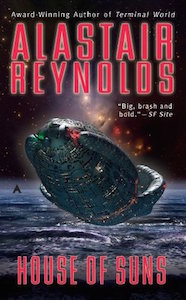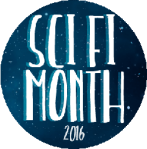 Alastair Reynolds is easily one of those authors I tend to read sight unseen, because he’s always able to sweep me into these complex, galaxy-spanning stories that never fail to appeal to my sense of wonder. House of Suns is indeed one such story, and without doubt it’s the best one I’ve read until now, both for narrative scope and for sheer entertainment value.
Alastair Reynolds is easily one of those authors I tend to read sight unseen, because he’s always able to sweep me into these complex, galaxy-spanning stories that never fail to appeal to my sense of wonder. House of Suns is indeed one such story, and without doubt it’s the best one I’ve read until now, both for narrative scope and for sheer entertainment value.
Shatterlings are post-human individuals, clones of their progenitors who created hundreds of copies of themselves with the purpose of traveling far and wide across the galaxy, gathering information that is shared among members of a given Line at meetings that take place at appointed times. Shatterlings are very long-lived and able to increase that augmented life-span to millions of years, through techniques of suspended animation and cryo-freezing that help them overcome the tedium of long treks through interstellar space.
Purslane and Campion are two such shatterlings from Gentian Line, the House of Flowers, who have entered into a forbidden association: flaunting the Lines’ rules they travel together and have become lovers, and at the beginning of the story they are also late for Gentian Line’s meeting, which will certainly result in censure from their peers. This circumstance, however, proves quite fortunate for them because on approaching the system where the meeting is being held, they discover there’s been a massive attack on Gentians and that only a handful of shatterlings survived the massacre, some of which the two lovers are able to rescue, heading toward a safe place where the survivors will regroup.
If the story takes a little while to gather speed, once this event is brought to the table the pace increases exponentially from the investigation of the reasons for the attack to the brutal interrogation of some captured enemy agents; from the crushing loss of a murdered Gentian shatterling to a breathless interstellar chase that will turn out to be a journey of discovery, both of unsuspected information and of very unpalatable truths. The events are narrated from three points of view, those of Purslane and Campion in the present and that of Abigail Gentian, the founder of the House of Flowers, from the past, this one in a series of flashbacks that give the backstory of the Lines in bits and pieces. Other interesting players are represented by a few of the Gentian survivors the two meet on Neume, the planet where the refugees have fled to, and the Machine People: sentient artificial beings like Hesperus – who has been held in stasis for thousand of years on a planet visited by Campion and Purslane – and Cadence and Cascade, two mysterious synthetics who have befriended the Gentian refugees.
Abigail Gentian is a fascinating creature: artificially stalled in childhood for over 30 years, she describes her life in a huge, planet-spanning and constantly changing house where she lives alone but for her tutor, the household robots and her mother, with whom she infrequently interacts through video communications, when the woman is able to overcome the mind-breaking paranoia she fell victim to. Abigail’s only companionship comes from the visits of a boy from another influential family: the two share a strange love/hate bond that finds its more intricate expression while playing with Palatial, an interactive game giving the two of them roles in a medieval-like adventure that can become far too immersive, to the point of losing one’s identity and memories. Despite these fascinating details, Abigail’s character remains elusive throughout the novel, as do those of Campion, Purslane and other Gentian shatterlings, a fact that robbed some of the enjoyment from the experience.
Granted, the shatterlings are Abigail’s clones, imbued with her memories, so it would stand to reason that there would be a sort of uniformity in the core of their personalities, but it would also stand to reason that each one’s accumulated experiences would add different layers to an individual’s psychological makeup, making every offspring different from his/her progenitor. Even their “voices” fail to carry any substantial differentiation: it took me a while to focus on the fact that Campion is male and Purslane female, since their alternating chapters “sounded” the same, at least in the beginning, when some reference to the other allowed me to understand who was speaking. This lack of definition became worse when other Gentian survivors were introduced: other than their names, and a few individual leanings – like Betony’s desire to take over as lead, or Mezereon’s cruelty in interrogating the prisoners – there was no firm sense of differentiation between them.
Purslane and Campion’s relationship suffers from the same brand of indetermination: we are told they form a couple, that they are forced to edit their memories of the liaison before any Line meeting, to avoid being reprimanded for disobeying the rules, but we never perceive them as a couple until events separate them and Campion launches in a desperate chase to reach Purslane’s ship and rejoin his lover. That’s the point where we are finally able to see the feelings they share for each other, how deeply they are rooted and what each of them is ready to sacrifice to insure each other’s survival.
Ironically enough, I thought that the more human, approachable character was Hesperus, one of the Machine People: the long imprisonment from which the two Gentians free him – or maybe some event prior to his incarceration – have robbed him of most of his memory, and there’s a gentle, almost child-like quality to his wistfulness about the loss, and the need to recover it, together with the purpose of his mission. This gentleness, and his selfless attitude in helping out the shatterlings in several occasions, quickly made him my favorite character and the one I found more relatable than the flesh and blood ones.
Despite these issues, I greatly enjoyed the book because the questions examined throughout the story appear much more important than the characters moving through it. More than the inexorable rise and fall of civilizations, more than the political and economical maneuvering of the great Lines, more than the observation of societies born out of human colonization, some of which have even transcended human form, what really held my attention was the focus on knowledge and memory. Knowledge seems to have become the galactic currency: no coin or precious metal hold the same worth as information, and the contents of individual “troves”, the stores where such information is collected, seem to have taken the place of bank accounts. And in the search of knowledge shatterlings can even take great risks, like Campion does, for example, when visiting the Vigilance, a sort of archive of enormous proportions, run by a forbidding, mysterious intelligence.
Memory, on the other hand, takes center stage during the whole course of the novel. The shatterlings store, edit and share the memories they have accumulated in their long lives, and are able to manipulate them – either to delete risky details (as Purslane and Campion do to hide their relationship from Gentian Line) or even to erase damning evidence, as the story reveals when survivors pursue the reasons for the attack on their Line. Hesperus lost every memory of his past, of his mission, of the reasons for his presence in that portion of space, and lack of that knowledge renders him incomplete – and at times even makes him appear suspicious.
Memory is identity, and here it also becomes the defining quality of one’s personality: Gentian Line strictly enforces the erasure of a particular memory, that of a heinous crime perpetrated without intention, yes, but still will tragic repercussions, and that choice is seen as the erasure of guilt, of the consequences of that long-ago choice. Does forgetfulness also imply forgiveness? This is the lynchpin on which the end revelation turns, and the partial answer that is given does not even start, unsurprisingly, to explore the issue.
Complex and fascinating, thought-provoking and engaging, House of Suns is the kind of novel that leaves me thinking about it even after I’ve reached the last page, and even though it ends in a quite abrupt manner, after slowing down the forward momentum reached until that point with some heavy exposition, it remains a very satisfying read. The kind of story that could no doubt gain from a re-read, and a highly recommended one.
My Rating:






 Alastair Reynolds is easily one of those authors I tend to read sight unseen, because he’s always able to sweep me into these complex, galaxy-spanning stories that never fail to appeal to my sense of wonder. House of Suns is indeed one such story, and without doubt it’s the best one I’ve read until now, both for narrative scope and for sheer entertainment value.
Alastair Reynolds is easily one of those authors I tend to read sight unseen, because he’s always able to sweep me into these complex, galaxy-spanning stories that never fail to appeal to my sense of wonder. House of Suns is indeed one such story, and without doubt it’s the best one I’ve read until now, both for narrative scope and for sheer entertainment value.

 This Culture novel was the most difficult and most puzzling in my experience with Iain Banks’ writing, so far, and still I am not sure about my feelings, if I truly liked it or not. The novel was enjoyable, of course, and it also was a quick read, its momentum provided by the rapidly advancing plot, but still it seemed as if something was missing: certainly I did not feel as invested in the characters as I was with previous books, and this might be the reason for my faint dissatisfaction, considering that characterization was the strongest point of the novels I read before this one.
This Culture novel was the most difficult and most puzzling in my experience with Iain Banks’ writing, so far, and still I am not sure about my feelings, if I truly liked it or not. The novel was enjoyable, of course, and it also was a quick read, its momentum provided by the rapidly advancing plot, but still it seemed as if something was missing: certainly I did not feel as invested in the characters as I was with previous books, and this might be the reason for my faint dissatisfaction, considering that characterization was the strongest point of the novels I read before this one.

You must be logged in to post a comment.